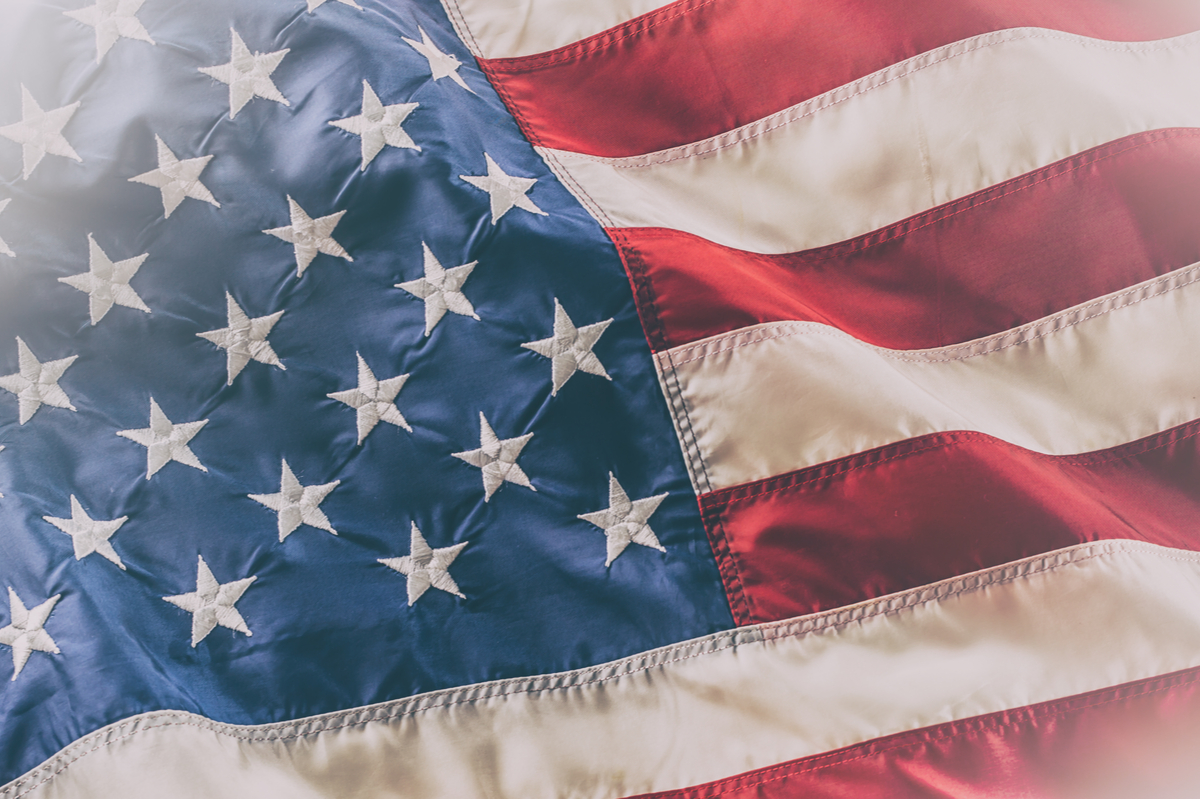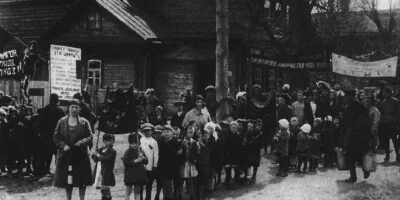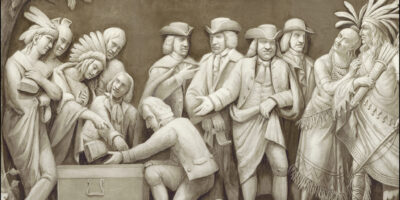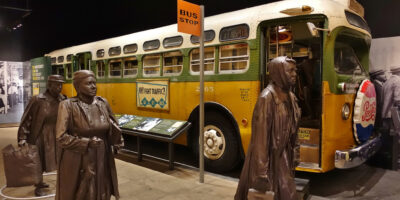Conservative Nationalism Is Not About Liberty
For almost 200 years there have been two political movements in opposition to the liberal political philosophy of individual liberty, free markets, and constitutionally limited government: socialism and nationalism. They both have called for reducing the individual to a cog in the machine serving a wider collectivist good. Given that socialism has been making a political comeback, it is not too surprising that there is a resurgent call for a new American nationalism.
During July 14-16, 2019, there was a conference held in Washington, D.C., devoted to the theme of “National Conservatism.” Some of the leading lights of various wings of the American conservative movement delivered talks on a revived American nationalism that would replace “the excesses of libertarianism” and the current identity politics of the political “left.”
Nations, Not Individuals, as Social Building Blocks
Not too surprisingly, journalists across the political spectrum took notice of the event, and reported on what was said and proposed for this new American nationalism. From the accounts, as much as the participants may have railed against the race and gender multiculturalism dominating “progressive” and democratic socialist propagandizing, a primary thrust in their vision for a new nationalism centered on a rejection of the classical liberal and libertarian elements that have been part of post-World War II American conservatism.
Being thrown out is the rhetorical allegiance to the idea and ideal of open and competitive free markets. American industries and jobs must be secured for Americans. Regulations must be introduced or reinforced to bring social media and big technology to heel to ensure that they serve and save American “values” and interests. Government must protect and restore American culture and virtues against the attacks of an ideology of internationalism and cosmopolitanism that would undermine the character and characteristics of traditional American society.
Several of the presenters went out of their way to insist that an American nationalism had nothing to do with “white” nationalism, that their version of American nationalism was inclusive of all Americans, regardless of race or ethnicity. One division among the speakers, it was reported, concerned America’s place in the world. Did a new nationalist America go looking for foreign monsters to slay in other parts of the world, or was American nationalism mostly pacific, only using its military power for defensive and related purposes when the “interests” of the country were directly and clearly threatened?
Also especially emphasized, from these accounts, was an explicit rejection by a number of the speakers of the notion of individual liberty as the foundation stone of the American political, social, and economic experience. Instead, “the nation” is the foundational building block of any society, including the United States. The “nation” determines, defines, and delineates the natural divisions among peoples around the globe. And it is through “the nation” that Americans, it was said, should have their sense of identity, loyalty, and subservience.
Families, Communities, and Identity
Since the beginning of time, people have had senses of connectedness and loyalty to others and things outside of themselves. The human being is born into a family that nurtures, cares for, and gives him a sense of meaning and orientation. At the same time, the family has usually been part of a tribe or community that provides an additional context of identity.
After all, it is in these families and communities that we learn a language through which we not only speak, but also think and have self-awareness of who and what we are. It is in these networks of family and communities that we participate in what sociologists sometimes refer to as shared “structures of intersubjective meaning.” We absorb notions and understandings of what is right and wrong, good and evil, just and unjust, fair and undeserved, proper etiquette and boorish manners, of what are the roles and places of people in society, and of the meaning of physical things in terms of what they are and how and for what they are used.
Through a good part of history these senses of belonging, identity, meaning, and loyalty were local. Until relatively recently, very few people traveled far from the places in which they were born and had died. With means of transportation limited to walking, riding a horse, riding in a cart or wagon pulled by an animal, or sailing ship or rowboat on nearby rivers and lakes, human life was geographically limited and confined to that small circle of family and local community.
In the ancient Greek world, loyalties and allegiances were to the city-state in which the person lived out their life, such as Athens. In the feudal era in Europe, loyalties included obedience and service to the lord of the manor, who owned the lands, the livestock, and the raw materials with which the villein or serf lived and worked on the nobleman’s estate. With the greater concentration of political power in the hands of kings in countries such as France in the 1500s, 1600s, and 1700s, loyalty extended to the monarch whose political legitimacy was above the lords of the manor; the king “owned” all within his kingdom including the manors of the noblemen, and, thus, the “commoner” in town or country was expected to be loyal and obedient to this higher authority in the form of a royal personage.
The End to Kings, the Birth of Nationalism
All this began to change with the coming of the “Age of Reason” and Enlightenment, especially in the 1700s. The idea of absolute and divine rule by kings and princes came to be doubted and questioned. The idea of the individual having rights independent of the pleasures of and privileges given by the monarch grew in awareness and belief. But it was with the coming of the American and French Revolutions that a change in personal identity within the wider society began to take shape.
In Europe, this was particularly symbolized by the beheading of Louis XVI, the French king, in January 1793. With the king no longer the locus of loyalty, to whom did the people of France owe their allegiance? When a messenger was sent to inform the revolutionary French forces in the east of the country, who were facing the invading armies of anti-revolutionary foreign monarchs, that the French king had been executed, one of the French officers asked, “For whom shall we fight from now on,” if not the king? The reply was, “For the nation, for the Republic.”
From this time may be dated the birth of modern nationalism. In 1794, the French revolutionary Bertrand Barère (1755-1841) said, “The Republic must penetrate the souls of citizens through all the senses.” The individual’s life, his work, his very being belonged to the nation, Barère explained:
Some owe [France] her industry, others their fortune; some their advice, others their arms; all owe her their blood. Thus, then, all French people of both sexes and of all ages are called upon by la patrie to defend liberty.…
Let everyone take his post in the national and military movement that is in preparation. The young men will fight; the married men will forge arms, transport baggage and artillery, and provide subsistence; the women will work at the soldiers’ clothing, making tents, and becoming nurses in the hospital for the wounded; the children will make lint out of linen; old men, again performing the mission they had among the ancients, will be carried to public squares, there to enflame the courage of the young warriors.… The houses of the nation shall be turned into barracks, the public squares into workshops, the cellars into factories of gunpowder.
In this new nationalist spirit, everyone was the property of the state, including children. Barère insisted that “the principles that ought to guide parents are that children belong to the general family, to the Republic, before they belong to particular families. The spirit of private families must disappear when the great family calls. You are born for the Republic and not for the purpose and despotism of families.”
Finally, Barère hailed the need for great public works for which all the economic resources of the country were to be made available through government-directed central planning. “The vice we ought to cure in this country is the versatility of principles of political economy.… What we need is a system of national works, on a grand scale, over the whole territory of the Republic.”
Thus was born the myth of “the people,” the “nation” as a collective entity with a will, a purpose, a meaning of its own for which the individual was to sacrifice his life and his fortune. And, in fact, the revolutionary government in Paris at that time soon imposed political tyranny and a planned economy in the name of “the people of France” as a whole.
What Is and Is Not a Nation?
What defines a “nation”? In a famous lecture delivered in Paris in 1882, the French historian Ernest Renan (1823-92) asked that very question (“What Is a Nation?”). He devoted much time to explaining what were unsatisfactory answers to that question. Nations were not the product of historical dynasties; they were not based on “race,” because in the reality of Europe there were no “pure” or homogeneous racial or ethnic groups, in spite of what a number of German intellectuals were already claiming at that time. While language binds people together in an almost-obvious way, it too has its limits in giving a complete answer; nor were religion or geography useful for a broad generalization.
Renan’s answer to the question was to suggest two elements, one that looks backward and the other that looks to the future: a heritage of a shared past and a consensual desire for continued shared community:
One is the past and the other is the present.… One is the possession in common of a rich legacy of memories; the other is present consent, the desire to live together, the desire to continue to invest in the heritage that we have jointly received.… These are the essential conditions of being a people: having common glories in the past and a will to continue them in the present; having made great things together and wishing to make them again.…
It presupposes a past but is reiterated in the present by a tangible fact: consent, the clearly expressed desire to continue a common life. A nation’s existence is (please excuse the metaphor) a daily plebiscite, just as an individual’s existence is a perpetual affirmation of life.
Some Nations Use Ethnic Lineage or Language
Historically, the intellectuals and political leaders who have ruminated on the rationales and reasons for nations over the last 200 years have defined a “national people” by many of the things that Renan rejected. It has been reflected, oftentimes, in what qualifies someone as a citizen of a country.
For instance, in Germany today nationality still remains partly a matter of “blood.” The descendants of Germans who migrated to Imperial Russia in the 1700s, and who often speak an archaic German, could claim German citizenship in the post-Soviet era by demonstrating that they were members of the Volga German community. While the French speak of loyalty to the values of the “Republic” in residing in France, in fact, a sense of French national identity is heavily based on use and allegiance to the French language and to what the French government and intellectual establishment refer to as French “culture.”
In Japan, the racial lineage of one’s parents defines your nationality. Thus, many Koreans who were born in Japan and whose parents and grandparents were born and have lived there have not been viewed as “real” Japanese, even if they formally have Japanese citizenship; they are racially classified as “Korean,” one consequence of which is often being treated as second-class or third-class citizens by the wider Japanese society.
National Identity and Government Schooling
Renan said that often the sense of shared nationality looking to the past has been due to hardships, defeats, or glorifying experiences that generations have jointly shared and about which knowledge has been passed on to later generations so that those who have followed those earlier periods of time feel a psychological linkage to those who are long gone. Though it may have happened decades or centuries earlier, contemporary members of a national group may say, “‘We’ defeated country X in the 1600s.” Or, “The armies of country Y occupied and humiliated ‘us’ in 1858.” Yet, clearly, the “we” and the “us” of today are very different and distant people from the “we” and the “us” of those earlier lived experiences.
But nonetheless, “we” as people living today in different parts of the world often express and actually “feel” that there is a connection between “us” and the people of that earlier time. That all such senses of identity and connections are ultimately “subjective” states of mind can be brought out by imagining a newborn “German” being adopted by, say, people living in Canada, and the child never being told of his birth history. He will grow up and very likely consider other citizens of Canada as the “us” of which he feels a part, and the “them” could be Germans that his (adopted) great-grandfather might have fought in World War II.
But how do most people come to have these senses of national loyalty and national common identity? A central part of this process is the imposed and compulsory educational systems that have been an increasing hallmark of all nation-states over the last 200 years. The governments in each country consider it an essential duty and responsibility to indoctrinate the new generation in what it means to be a German, a Frenchman, an Italian, a Japanese, a Nigerian, a Mexican, or an American.
Your country’s history is taught in government-run or -regulated schools. Your country’s “values” and belief systems are inculcated in the educational curricula of each nation-state. While loyalties, allegiances, and identifications with family, friends, and surrounding community members are, in a sense, inescapably “natural” — they are the immediate “worlds” in which we grow up, experience life, and go about living — nationality and a sense of nationalism are far more creations of the political authorities under which we respectively live.
How else can governments get people to acquiesce in paying taxes, accepting regulations over their life, and fighting in wars that usually having nothing to do with a political regime concerned only with “negatively” protecting each individual’s life, liberty, and honestly acquired property from the aggressions of others?
From the Local to a Global Community
When we live in a world in which we are no longer constrained and limited by primitive means of travel and communication, in which we can be almost anywhere in not much more than a day, and in which we may talk or text or video converse with people around the globe almost instantly, the natural patterns of association, connectedness, and relationship in many social, cultural, and economic dimensions can more intensively take a shape that encompasses others around the entire planet, compared to the narrow geographical confines of people a mere two centuries ago.
We are all, increasingly, “citizens of the world,” that is, social, cultural, and economic cosmopolitans. National, like municipal, county, and state, boundaries may serve as useful administrative units and jurisdictions for administering law enforcement and other protections of people’s individual rights. But they are unnatural and obstructive in terms of the free and spontaneous patterns of human society outside of and beyond the political lines on maps marking the borders of nation-states.
New Nationalists and “Progressives” Look Backwards
The proponents of this proclaimed American “conservative nationalism” are attempting to go backwards, just like their collectivist cousins, the “progressives,” democratic socialists, and identity-politics warriors, who they so vehemently say they want to defeat. They, too, wish to impose economic planning on the citizens of the United States, only they would pick and choose differently than those other collectivists, in terms of what industries, employments, and consumption goods would be fostered or restricted through government regulations, prohibitions, or subsidies of support.
They, too, want to mold and manage the ideas of the young to make them “good citizens” through mandatory schooling and imposed curricula, only the content and the desired outcome would be different for these conservative nationalists than the other brands of modern American collectivism. They, too, want to socially engineer society into shapes and forms that they consider virtuous and true to a “good” America, only they mean something different than the multiculturalists they say they so much dislike.
If the “progressives” and identity-politics types want a multicultural socialism based on gender and racial tribalism, these conservatives are hankering for a national socialism of declared and imposed “traditional values” guided by an “America First” view of things — with someone having to define and dictate what is to come “first” in place of free individuals in the new nationalist America through government command and control.
Some of the Freedoms Defining an “American”
So what makes an American? What is the meaning of an American “nationality”? To begin with, it does not refer to race, gender, ethnicity, religion, language, or a narrowly defined culture.
Almost from the start, America was far more a land of many blended peoples. Already in the late 1700s, the Frenchman J. Hector St. John Crevecoeur (1735-1813) in his Letters From an American Farmer (1792) referred to America’s “strange mixture of blood, which you will find in no other country. I could point out to you a man, whose grandfather was an Englishman, whose wife was Dutch, whose son married a French woman, and whose present four sons have now four wives of different nations.”
The 19th century only intensified and extended this unique quality of a “new people” made up of many different peoples from more and more different lands. The American “melting pot” was brewing its special mix even before the founding of the United States. The same became true concerning religion, as well. Protestant denominations predominated in young America, but there were from the beginning Catholics and Jews, and even a few Muslims. The increase in Catholics due to the large number of, especially, Irish immigrants in the middle decades of the 19th century did create tensions and even sectarian violence at times; but in the end, religious tolerance and diversity of faith were far greater and more peaceful than almost any other place in the world. Freedom of religion was not merely talk.
The English language dominated the American scene, and most immigrants expected and wanted to acquire at least a working knowledge of the general means of communication in their new land. But nothing prevented those from other parts of the world from speaking their native tongues and publishing newspapers and books in the languages of the “old” countries. Pressures to learn and speak English were more social than political through most of American history, though, admittedly, compulsory public schooling was meant to create an environment of greater linguistic and cultural homogeneity. But no laws forbade or repressed linguistic liberty in America.
The only regrettable and, indeed, reprehensible dividing lines between peoples was the result of African slavery in the southern states and callous and cruel treatment of the American Indians. The Indians were brutalized and their remnants banished to government-managed islands of socialism and political dependency called “reservations.” And while a slaughterhouse of blood and destruction brought about the end to slavery, racial prejudices lingered on in the reprehensible form of segregation laws in the South well into the 20th century, and racial bigotries persisted in the supposedly “enlightened” North for far too long.
Greater Practice of What Has Been Preached
Today, in spite of the “progressive” and identity-political rhetoric, racist and discriminatory attitudes and practices have dramatically disappeared from the American scene, if they are compared to attitudes and actions 50 years ago, 75 years ago, and certainly 100 years ago. Color awareness and color consciousness, in my opinion, is fostered and reinforced primarily in contemporary America by the race and gender identity-politics warriors and ideologues. They are the ones trying to cultivate and perpetuate these primitive tribal collectivisms, being merely variations on the Marxian “class” conceptions of human society.
And the same, again in my opinion, is no less true concerning attitudes and actions about women in society. If a female Washington political “fix-it” specialist on the television show Scandal can be black with two white male lovers, one of whom is the president of the United States, and if the next movie 007 is to be a female and black “James Bond,” and nobody cares culturally or in the TV ratings or the box office take, well, then, we have come a long way, baby. Fifty years ago, this would have torn people apart in American society. Today, it’s just a yawn, except for a handful of outlier idiots.
The Oath of Allegiance to the U.S. Constitution
So what makes an American? It’s captured in the oath of allegiance taken by anyone becoming a citizen of the United States. It says, in part:
I hereby declare, on oath, that I absolutely and entirely renounce and abjure all allegiance and fidelity to any foreign prince, potentate, state, or sovereignty, of whom or which I have heretofore been a subject or citizen; that I will support and defend the Constitution and laws of the United States of America against all enemies, foreign and domestic; that I will bear true faith and allegiance to the same.
Again, there is no mention of a particular race or ethnicity, or to a particular language or religion, or geographical part of the world. The new American citizen is giving his or her allegiance to the Constitution of the United States and to defend it against all those who are its enemies, abroad or at home.
But what is the Constitution? In fact, it is an organizational chart specifying and delineating the functions and responsibilities of the three branches of the federal government and those who occupy the elected or appointed positions in it. With it is an accompanying Bill of Rights reminding citizens and officeholders alike of specific limits on the powers of that government.
Why take an oath of allegiance to an organizational chart? Because the Constitution was meant to serve as the political institution to uphold and preserve a set of ideas expressed in an earlier document, the Declaration of Independence. The Declaration may, itself, not be considered a legal document in the official law of the land of the United States, but it is nonetheless the spirit and guiding star which the Constitution was designed to secure.
Liberty as the National Identity of an American
What made an American in the past was a belief in and devotion to the idea and ideal of individual liberty, of a self-governing society not only in the form of political representation, but far more importantly in the vision of self-governing individuals possessing certain inalienable rights to life, liberty, honestly acquired property, free and voluntary and peaceful association with any and all others, through which each had the freedom to pursue happiness as they saw and desired it.
This idea and ideal was explained by Austrian-born American historian and political scientist Han Kohn (1891-1971) in American Nationalism: An Interpretive Essay (1957):
The tie which united [the 13 independent states after the Revolution] — and at the same time from other nations — was not founded on the common attributes of nationhood — language, cultural tradition, historical territory or common descent — but an idea which singled out the new nation among the nations of the world.
What was this idea? It has found expression in the Constitution and in the Bill of Rights.… It avoids any flourish of the kind characteristic of the constitutions of the French Republic. It does not solemnly proclaim the sovereignty of the nation nor invoke high moral or religious principles. It draws its lasting strength not from what it says but from what it is: the embodiment of the idea by which the United States was constituted — a nation without even a name to which emotions could cling, like England, France, Italia or Hellas, yet from its beginning appealed to the imagination of men as the first nation to identify itself and to have been identified by others with an idea. To become an American has always meant to identify oneself with this idea.
What is this idea? It is the English tradition of liberty.… John Locke is the representative philosopher of this tradition.… But in one decisive respect the North Americans went beyond the English idea of liberty.… The historical birthright of Englishman became in America, under the influence of 18th century ideas, the natural right of man, a universal message, the birthright of mankind.… A daring experiment expectantly or distrustfully, watched by the whole of Western mankind.
American “nationalism,” if we are to call it this, is neither identity-politics socialism nor this newly proclaimed “conservative” national socialism. It was, and should be, an allegiance to individual liberty and unlimited economic freedom of trade and association for all things peaceful. The American nation is and should be a country of free individuals bound together by a belief in a society of liberty, not a collective mythology of tribes, races, or “classes” to which the individual is subservient and for which he may be sacrificed and subjugated.
When in the middle of the 1950s Hans Kohn wrote his interpretation of an American nationalism founded on the idea of liberty, he could say, in the wake of the defeat of fascist and Nazi collectivism and in the confidence that Soviet communism would, also, fail in its quest for global victory, that “American liberty, rooted in English liberty, has been able to withstand the temptation of abstract millenarianism,” that America, at the end of the day, would remain faithful “to the tradition of liberty, to the limitation of governmental authority, by whomsoever exercised, and to the protection of the rights of individuals and of minorities.”
In the 60 years since Hans Kohn wrote about his faith and hope in America as a nation of liberty, the trend toward collectivism has continued in a variety of directions in the United States, especially in the economic arena, along with the growth of the welfare state, and with political infringements on freedom of association in a variety of corners of everyday life.
If this trend is to be halted and reversed, if the “regressivism” of tribal identity politics is to be defeated, and if the spirit and practice of classical liberalism is to be restored, it will not be through the call to and the imposition of a new conservative nationalism. The latter is a false political god that will not bring America to salvation. It will only reinforce the anti-liberal forces that wish to destroy what remains of freedom in America.











